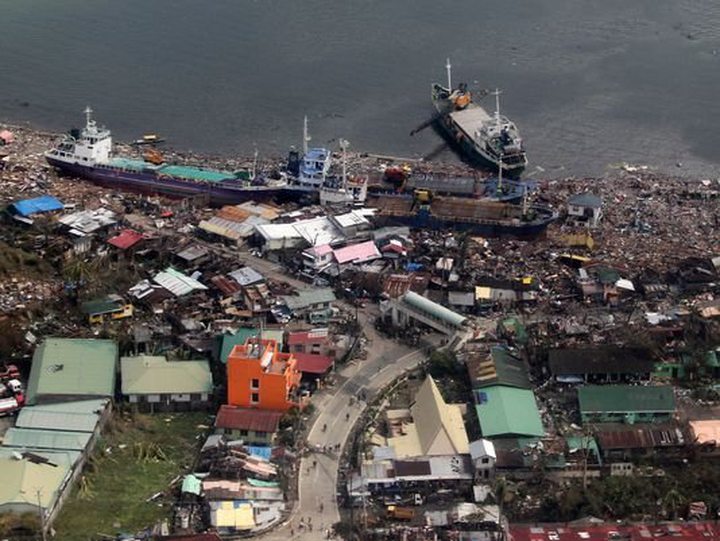Horror Stories as 10,000 Feared Dead in Typhoon Haiyan

MANILA — The Philippines was still trying to comprehend the destruction that Typhoon Haiyan brought to this string of islands in the Pacific on Sunday.
Rescue and relief efforts were having trouble getting to the scene of the most damage, such as Tacloban, where even the Red Cross saw its offices damaged.
"This area has been totally ravaged", said Sebastien Sujobert, head of the International Committee of the Red Cross in Tacloban. "Many lives were lost, a huge number of people are missing, and basic services such as drinking water and electricity have been cut off," he said.
Corpses hung from tree branches and were scattered along sidewalks and among flattened buildings. People raided grocery stores and gas stations in search of food, fuel and water.
As many as 10,000 people may have died when one of the most powerful typhoons ever recorded destroyed entire villages and devastated cities with huge waves and winds of nearly 150 mph (240 km/h).
A weakened but still powerful Haiyan was churning through the South China Sea and made landfall in northern Vietnam, which evacuated tens of thousands of people.
At the White House, President Obama said he and his wife Michelle are "deeply saddened'' by the death and damages in the Philippines and said the United States is assisting relief and recovery efforts. He praised the country's people for "incredible resiliency.''
In the Philippines, authorities were still trying to get to islands that no one had been able to communicate with since the typhoon struck Friday. But those reached revealed immense damage to homes, roads and buildings.
Frantic relatives crowded into the Villamor Airbase in Manila to wait for transport planes that were rescuing people from at least six of the archipelago's more than 7,000 islands that were hit hardest.
Maritess Tayag, in her 40s, and her sister, Maryann, 29, arrived at the airport dizzy, shaken and thirsty but elated to be alive. They came from their home in Tacloban on the island of Leyte, one of the hardest hit by the typhoon.
"I was in the house — trapped in my room. The water is up to my nose — I cannot breathe anymore. I am trying to save myself," said Maritess Tayag, describing the early hours of Saturday when ceaseless wind drove dark seawater mixed with foul-smelling water from canals higher and higher into their homes.
Her brother was in the house, too, trying to keep his head above the rising water, she said. But, "It reached up over his head. Then a big wave of fast flood reached up higher.
"I feel I would die at this moment because I can't — I don't know what I will do," she said, crying.
"I cry a lot of cry shouting 'Mom!' Open, open please open help us somebody."
Her younger sister and sister-in-law made it to the roof. Her brother and mother did not, she said, and both are probably dead.
Maryann described their town as looking as if it was a "World War II city" and said everyone was trying to flee in fear after the typhoon winds ended Saturday.
"It was almost a stampede at the airport in Tacloban," she said. "Everyone was trying to get on the plane. It's really, really terrible."
It was not until Sunday that authorities communicated with Leyte island. The sisters said there was no power or phone service. They said they saw looting everywhere. Food and water are almost non-existent, they said.
"It's all washed out ... including the hospitals and malls, by the strong winds and floods that came," Maritess said in a quivering voice.
"The hardest thing is ... seeing you mother floating in the flood and you don't know what to do. You just see there and the only thing is have to save yourself," Maryann said. "I could not save her because she drowned already, and it was not just water from the sea but mixed with dirty water — color black, like came from river and smell like canal."





